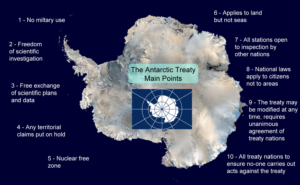In news
Antarctic treaty 1959 celebrated its 60th anniversary recently
Antarctic treaty 1959
- The Antarctic Treaty and related agreements, collectively known as the Antarctic Treaty System (ATS).
- The treaty entered into force in 1961.
- The treaty sets aside Antarctica as a scientific preserve, establishes freedom of scientific investigation, and bans military activity on the continent.
- Negotiated during the middle of the Cold War by 12 countries with Antarctic interests, it remains the only example of a single treaty that governs a whole continent.
- The treaty is also the foundation of a rules-based international order for a continent without a permanent population.
- For the purposes of the treaty system, Antarctica is defined as all of the land and ice shelves south of 60°S latitude.
- Membership: Membership of the treaty has grown in the intervening years, with 54 signatories today.
- The original signatories were the 12 countries active in Antarctica during the International Geophysical Year (IGY) of 1957–58.
- The twelve countries that had significant interests in Antarctica at the time were: Argentina, Australia, Belgium, Chile, France, Japan, New Zealand, Norway, South Africa, the Soviet Union, the United Kingdom, and the United States.
- A protocol to the 1959 treaty was signed in 1991.
- The agreement banned mineral and oil exploration for 50 years and included regulations for the protection of the Antarctic environment.
- India officially acceded to the Antarctic Treaty System on 1 August 1983 with a consulting status.
- The treaty is short and contains only 14 article, some of them are:

On territorial claims-article IV
- It effectively seeks to neutralise territorial sovereignty in Antarctica
- For the Antarctic territorial claimants, this meant a limit was placed on making any new claim or enlargement of an existing claim.
- And one sector of Antarctica is not subject to the claim of any country, which effectively makes it the last unclaimed land on earth.
- It also put a freeze on any disputes between claimants over their territories on the continent.
Extra reading: https://journalsofindia.com/antarctica-a-continent-of-superlatives/
















